新通用大学英语综合教程4总复习
新通用大学英语综合教程第四册听力及答案-unit-3

UNIT 3 Money MattersUnit GoalsTalk about your financial goalsExpress buyer’s remorseDescribe your spending habitsDiscuss reasons for charitable givingWrite a composition about the themeLesson 1Lead-inOn-the-Street Interview: I’m a little better about saving…A. Match each statement with the person who said it. You will use one name twice.1. b2. c3. b4. aB.Complete each sentence with the correct name1. Joe2. Deepti3. Deepti4. Joe5. Deepti6. LisaVIDEO SCRIPTInterviewer: So tell me a little bit about you and money—whether you are good at saving, or can you save for something special. Do you just blow all your money as soon as youhave it?Deepti: Well, when I was growing up in India, my parents were, you know, very open and free with money. So if I wanted something, they would say, “OK, you can go ahead and take this.” And I think that spoiled me a little bit, because I would just, whatever I wanted,the importance of saving I’d take the money and go buy it, and I didn’t really realizemoney. So when I grew up, I was twenty-two, and I left India to go to Singapore, and Iwas on my own, and I had a scholarship, and my father would, on the phone, he wouldtalking ask me, “So, how much money have you saved?” And I was like, “What are youabout? I’m not saving any money.” A nd he got married, and he wanted me to startsaving money. It was very hard for me to save money because I would go out and walknd be past a shop that had clothes and go, “Oh, I want that,” and I would go in, get it, areally happy. It made me happy, you know. But, I think after a year or so when I realizedthat I had to take care of myself, not only now, but let’s say a year from now, and a yearo start saving so from now I might not have the money that I’m getting now, so I have tthat I’m not, you know, no the streets without any money. So I started saving, but I stillhad a hard time with it. My sister is very good. She is very stingy with money, you know.o on, spend the money. You And when I was in India, I would tell her, “Oh come on, gknow, if you want something, go get it.” And she would always tell me,” You should think about our parents. They’re making all this money for us, but we shouldn’t spend it just like that.” I think now I am a little better about s a ving, but not very good. Not as good as Icould be.Joe:I think I’m very good at handling money. I save when I need to; I spend when I wouldlike to. I try to keep control of my funds so that I don’t end up in situations where I don’have money to pay for basic necessities. But I do feel that you should spend money thatyou have while you have it and while you’re here, as opposed to saving it for a rainy daythat never comes.Interviewer: And saving, what are you trying to do to save? Have you made a plan?Lisa: I have made a plan. I, what I do now is just take out a certain amount of money atthe beginning and save it. I just put it away before I even really see it. So that way I canlike build up and spend whatever else I have.Interviewer: And is that working?Lisa:It’s going pretty well. It’s going pretty well. I have a little bit of something saved up.ListeningPart 1Talk About Saving MoneyA. Read and listen to a conversation between two friends about saving money.Teaching SuggestionsStep 1Have students look at the pictures. Ask What is it?What do you think it’s used for?Step 2Then ask How do children save money in this country?Step 3After students read and listen, ask What did Judy buy?(an entertainment system) Did she pay in cash or by credit card? (in cash) Is she rich? (No.she had to save up for it.) How did she save enough money? (She cut back on spending;She started living within her means.)Step 4own experiences, ask Have you ever put money aside to buyTo draw on students’ something you wanted, such as an entertainment system, a computer, a bicycle, or a car?Encourage students to share their experiences. Ask Was it hard to save the money youneeded?Language note: Students may need help with the following words or expressions: strike itrich (suddenly make a lot of money); cut back on (reduce the amount, size, cost, etc., ofsomething); out of hand (impossible to control).Save, save up, put money away, and put money aside have the same meaning. (Thelatter is introduced in lesson 2.) They can be followed by an infinitive or for and a noun.For example, I want to put money aside to buy a car; I’m saving up for a new car; I’mputting money away for a down payment.Kind of is an expression used in spoken English meaning slightly or in some ways.Culture note: A piggy bank is a container used mainly by children to store coins. Piggybanks are to encourage good saving and spending habits: the pig must be broken openfor the money to be retrieved, forcing the child to justify his or her decision. The namepiggy bank originated in the twelfth century; pygg referred to a type of clay used formaking jars people stored their money in. By the eighteenth century, the term pygg jar had evolved to pig bank.Option: On the board, write the following expressions:Did you strike it rich?My bills are totally out of hand.I need to live within my means.I cut way back on spending.In pairs, have students think of different ways to say each expression. 〔+5-10 minutes〕B. Pair Work Listen to the conversation again. Then discuss the questions and explainyour answers.1. No, she does not.2. No, he is not.3. She had a lot of credit card debt.4. She cut back on her spending.5. She has a high financial IQ.6. The answer will vary.Teaching SuggestionsStep 1Have pairs discuss the questions. Review the answers to questions 1-5 as a class. Call onstudents to share their explanations.Step 2Have volunteers share whether they are more like Judy or David and give a supportingreason. (Possible responses: I’m more like Judy because I try to live within my means; I identify with David because I spend a lot of money on bills.)Step 3Have a volunteer read the statements out loud. If necessary, clarify the meaning of I can’tmake ends meet. (The money I earn every month is not enough to cover my expenses.)Step 4Point out the useful language to talk about managing money: live within / beyond your means; keep track of your expenses; put money away into saving; pay your bills off / in full;make ends meet. Have students underline these expressions.Step 5Have students choose the statements individually.Step 6As pairs compare their answers, encourage them to give specific examples for each item.For example, I live beyond my means. When I go shopping, I just can’t help buying the things I like.Step 7Ask What habits would you like to change, if any? What can you do to raise your financialIQ? (Possible response: I only keep track of my most important expenses. I think I shouldbuy some financial planning software to get better organized and keep track of all my expenses.)Step 8To review, have volunteers talk about their money spending / saving habits with the class.Part 2Describe Your Spending HabitsA. Listening Comprehension.Read the statements. Then listen to a radio call-in show and check True or False.1. T2. T3. F4. FScript( L = Lara Savino, U.S, New York; S = Steve )L: Welcome back to Money Talks. I’m still your host, Lara Savino. We’ve got some listeners on the line with financial questions. Let’s go to our first caller … Steve, you’on the air. Talk to me.S:Hi, Lara. I’m afraid I’m really having problems making ends meet.L: Tell me about it.S: I earn a good living, but it seems like no matter how much money I make, I can’t seem to catch up.L:Believe me, you’re not alone, Steve.S: Sometimes it feels that way.L: Let me ask you something. Do you put anything away for a rainy day?S:You mean savings? No way. There’s ne ver enough for that.L:Well, here’s a tip for you, Steve. From now on when you spend money throughout theday …?S: Uh-hmm.L:Don’t spend any of your change. When you get home every evening, put your loosechange in a jar. You’ll be surprised how much you’ll have saved up in even a fewweeks.S: Wow! I never thought of doing that.say, once a month, OK?L:And put that change you’ve saved up in the bank—S:OK. I’ll try that.L: Steve, what about debt? Are you maxing out on your credit cards?S: Well, yes, I do use credit cards, if that’s what you mean.L: Do you pay you bills on time?S: I try to.L: Do you pay the minimum, or do you pay off the whole thing each time.S: Well, it kind of depends on how much it is.L: Well, are you drowning in credit card bills, or have they been fairly reasonable so far?S:Well … I guess I’d have to say I’ve been drowning in debt.L:OK, Steve. Here’s what I want you to do. How many credit cards do you have?S: Maybe ten or twelve.L:Steve, that’s a lot of cards. Decide which two you want to use regularly, OK?S: OK.L: Take all the other cards and cut them up.S: Cut them up?L:You heard me. Cut them up. You can get along just fine with two credit cards. If you’re using ten or twelve credit card, Steve, that tells me t here’s something wrong with thispicture. You see what I mean?S:Well, I’m not sure.L:Steve, if you want to keep your head above water, you’ve got to live within your means.That means spending less than you’re making, not more.S: Oh.L: OK, Steve. Her e’s one other thing I’d like you to do.S: Yeah?L: Sit down and plan a budget for yourself.S: A budget?L:That’s right. If you feel like your finances are out of control, then you need to take thebull by the horns and take control of your finances. You follow me?S: I think so.L:Sit down and make a list of all your regular expenses. Keep track of how much you’re spending on everything and I mean everything, OK? Try that for three months and seeif it doesn’t help you out.S:OK, I’ll give it a try.L: And Steve.S: Yeah?L: When you plan that budget, make sure you treat yourself to something nice once in awhile, OK?S: Really?L:You bet. If your budget is nothing but don’t spend, don’t spend, it isn’t going to work.Know what I mean?S: I hear you.alk to me!L:Good luck, Steve. Next caller. You’re on the air! TTeaching SuggestionsStep 1Have students look at the photo and read the caption. Ask What do you think the woman’s occupation is? (a radio host) Do you ever listen to the radio? What kind of programs doyou listen to? What kind of show do you think Lara Savino hosts?Step 2Pre-listening: Ask What’s a radio call-in show? (a radio program in which people call togive their opinions or ask questions)Step 3Have students read statements 1-4.Step 4First listening: Have students listen and decide if the statements are true or false.Step 5Second listening: Have students listen for information to support their answers.Encourage them to take notes.Step 6Review as a class. Have volunteers share their answers. (Possible answers: 1. True.Steve says he can’t make ends meet and never has enough money to save. 2. True.Steve says he’s drowning in debt. 3. False. Steve says there’s never enough money to put any away in savings. 4. False. Lara suggests that he try to keep a budget for three months.He hasn’t started yet.)Language note:maxing out on his credit cards, she’s asking if he When Lara Savino asks Steve if he’sreaches the maximum credit limit on his credit cards each month. Buying on credit is an arrangement with a store, bank, credit card company, etc., that allows you to buy something now and pay for it later. A budget is a careful plan of how you will spend money.B. Now listen again. What are the three tips Lara Savino gives the caller?1. Save his change and put it in the bank2. Only have two credit cards3. Sit down and plan a budget .Teaching SuggestionsStep 1Have students listen for the three tips Lara gives.Step 2Have students compare answers with a partner. If necessary, have them listen again forconfirmation.Step 3Review tips as a class. Have volunteers share the tips with the class.c. Vocabulary. Describing spending habits. Listen and practice.Teaching SuggestionsStep 1Have students listen to the words and study the definitions. Then have students listen andrepeat the words chorally.Step 2Point out that some of these words have a positive connotation, some have a negativeconnotation, and one is neutral.Step 3Have pairs read the definitions carefully and decide the connotation of each word.Step 4To review, write the column headings Positive, Negative, and Neutral on the board andhave students say the vocabulary words for each column. (Positive:generous, thrifty,frugal; Negative: a spendthrift, a cheapskate, a tightwad, cheap, stingy; Neutral: a big spender)Vocabulary-Building StrategiesOption: Have students think of someone they know whose spending habits they woulddescribe using one or more of the vocabulary words. In pairs, have students describe thatperson’s habits. To review, have volunteers tell the class about the person their partners described. 〔+5 minutes〕D. Complete the sentences about people’s spending habits.1. a cheapskate/a tightwad2. generous3. cheap/stingy4. a big spender5. thrifty/frugal6. a spendthriftTeaching SuggestionsStep 1Model the first item with the class. Point out that to choose the right words, students should take into account both meaning and grammar. For example, in item 1, cheap and stingy match the context, but a noun is necessary, so the correct answer is a cheapskate or a tightwad. Point out that more than one word might be possible.Step 2Have students compare answers with a partner. Then review as a class.SpeakingA. CONVERSATION SNAPSHOTTeaching SuggestionsStep 1Have students look at the photo. Ask What kind of electronic product do you think this is?(an MP3 player) Elicit from the class that an MP3 player is an audio player onto which you can download songs from online music stores or from your own collection of music storedin your computer to listen to.Step 2Have students read and listen to the conversation. T o check comprehension, ask What didery the man buy? (a new MP3 player) Is he happy with it? (no) Why not?(because it’s v hard to operate) Did he know this before buying it? (no. otherwise, he would have boughta different brand.)Step 3To draw on students’ own experiences, ask them if they have an MP3 player. If some students have one, ask Are you happy with it? Is it hard to operate? What brand is it? Howlong does it take to download a song?Language note: Students may need help with the following expressions: Lucky you (used to say that someone is fortunate); to tell you the truth (used to emphasize that you are being very honest); I could kick myself (said when you are annoyed with yourself becauseyou have realized that you made a mistake or missed a chance); What a pain! (used to say that something is very annoying); You’ve t elling me(used to emphasize that you already know and agree with something that someone has just said).Rhythm and intonation practiceStep 1Have students repeat chorally. Make sure they:○ use emphatic stress for you in Lucky you!○ pause slightly after truth in Well, to tell you the truth . . .○ use falling intonation but higher pitch for What do you mean?○ use emphatic stress for hours in It took me hours to figure out . . .○use emphatic stress for me in You’re telling me.. . .I would have gotten . . .○ use the contracted form would’ve in○ use the following stress pattern:STRESS PATTERN——·——···—···—··——·——A: Hey, I heard you got an E-tec M P 3 player. Lucky you!——·——··——··——··B: Well, to tell you the truth, I could kick myself.——··——A: What do you mean?··—·—····——·—·····——······B: I had no idea it would be so hard to operate. It took me hours to figure out how to ——··——download a song.——·——A: What a pain!——··——··——···——··——·——B: You’re telling me. Had I known, I would have gotten a different brand.B. Vocabulary. Expressing buyer’s remorse. Listen and practice.Teaching SuggestionsStep 1Elicit the meaning of buyer’s remorse from the class. (a strong feeling that it was a mistake to have bought something)Step 2Have students listen to the statements and look at the illustrations. Then have studentslisten and repeat chorally.Step 3To check comprehension, have students look at each picture and ask What is the woman(the TV)spending a lot of money on? (car service) What is too big for the man’s room?What is the man trying to figure out? (how to put the second system together) Why is thefood processor collecting dust in the closet? (because nobody uses it)C. listening Comprehension. Listen to the conversations in which people regret havingbought something. Complete each statement by inferring the reason for buyer’sremorse.1. b2. a3. b4.b5.aScriptConversation 1F: Wow, what a g reat juicer! That’s even big enough for my family!M: Actually, I hardly ever use it. It’s way too big. I have such a small kitchen.F: So, why’d you buy it?M: I got it on sale—at a great price.Conversation 2M: I see you bought a digital camera. How do you like it?F: Well, I might like it if I could figure out how to use it. Truth is, it’s a pain in the neck. M: What do you mean?F:It has way too many features. Believe me, if I had known you couldn’t just point and shoot, I never would have gotten it.Conversation 3F1: Hey, I love your new exercise bike! It must be great having one of those.F2: Well, yes and no.F1: What does that mean?F2:I like it, but I guess I’m just a couch potato. I just don’t use it enough.Conversation 4M1: What a cool sound system! You just get it?M2: Yeah.M1: Look at all those pieces. When are you going to put it all together?M2:Well … that’s a problem actually. There are so many components. And the instructions don’t help at all. Look.M1: Whoa! That looks pretty complicated.M2:Had I known how complicated it was going to be, I would have gotten a different model.Conversation 5M: Love your new car! You must be on cloud nine driving that thing!F:Oh, it’s fun to drive, but I’m not so sure it’s worth it.M: Really? Why?F:You wouldn’t believe it. Between the premium gas and visits to the mechanic … It’s costing me an arm and a leg!M: Ouch!F:I can’t afford to drive it! Probably wouldn’t have bought it had I given it more thought.Teaching SuggestionsStep 1First listening: Have students listen to the five conversations and identify what eachperson has bought. Review as a class. (1. a juicer, 2. a digital camera, 3. an exercise bike,2. a sound system, 5. a car)Step 2Second listening: Have students listen and complete the statements.Step 3Third listening: In pair, have students write down phrases from the conversations tosupport their answers. Review as a class. (1. “It’s way too big.” 2. “I might like it if I could figure out how to use it.” 3. “I just don’t use it enough.” 4. “There are so many components. And the instructions don’t help at all.” 5. “. . . it’s costing me an arm and a leg!”ReadingText ABackground Information (少)Key Words and ExpressionsAquarium n.玻璃养鱼缸We went to Stanley Park and the aquarium,up Grouse Mountain,and to museums and galleries.The colorful and active platy provides a vivid contrast to the rich greenplants in your aquarium.bulky adj.体积大的To protect himself, Ruiz used to wear a bulletproof vest under his suitjacket, but the vest was bulky and hot.Traditional lithium-ion batteries have carbon electrodes, which arerelatively bulky for the energy they provide.gadget n. 小机械;小装置Are you looking for a cool back-to-school gadget?A corkscrew is a very useful gadget for opening bottles of wine. purchase v.购买Employees are encouraged to purchase shares in the firm.The new couple spent some money for the purchase of the furnaturenecessary for their new house.remorse n.懊悔;悔恨He was filleed wuth remorse for having refused to visit his dyingfather.In a fit of remorse she burnt all her lover,s letters.screwdriver n.螺丝起子You turn the screws round and round with a screwdriver.I can't find a screwdriver but this serve the purpose.spin v.快速旋转;(车子)飞奔Her top spin, back spin and side spin contributed a lot to herwinning of the final.It takes Pluto 248 Earth years to spin around the Sun.tropical adj.热带的;炎热潮湿的I perfer to eat tropical fruits.Some animals can not indure tropical climate.wagon n..四轮运货马车;运货牛车Among the remains of a scorched wagon,you find three corpses and a Wand of Fire.A four-wheeled, open, box-shaped wagon or iron car run on tracks in a coal mine.wrap v.包,裹(某物);用(东西)把…裹起来I wrapped the rug around the sick man's legs to keep him warm.The assistant wrapped it up for her as quickly as possible. Teaching Suggestions 少Reference Translation购买礼物者指南选择礼物时要考虑的事情你总是经历过一个购买者的后悔心态的——那种后悔的感觉往往来源于购买了那些不需要的或者根本不该买的东西。
全新版大学英语综合教程第四册第四单元

目录
• Unit Overview and Learning Objectives
• Intபைடு நூலகம்nsive Reading and Understanding of Texts
Key and diversity points tips
Key Points:
+Identify the main arguments and perspectives presented in the readings and speeches
+Understand the cultural and historical background of the unit theme
• The article highlights the benefits of critical thinking, including improved decision making, enhanced creativity, and greater ability to adapt to change
• The author resources educators to prioritize the teaching of critical thinking skills in order to prepare students for the challenges of the 21st century
The author uses rhetorical devices such as analysis and example to illustrate the importance of critical thinking
大学英语综合教程4 第4单元知识点
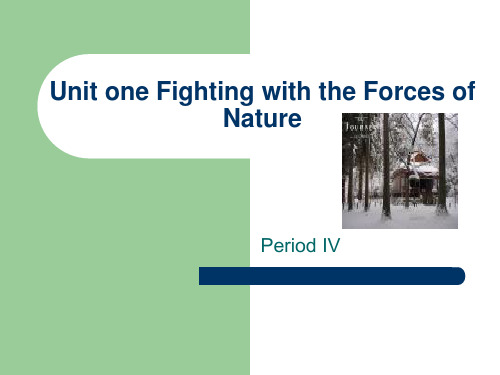
Before Reading
Global Reading
Unit 1 Fighting with the Forces of Nature Detailed Reading After Reading Supplementary Reading
reckon: v. count; consider; think
Language enhancement (translation)
4. As the economy shows no signs of picking up, many companies cut back on capital investment.
5. Their marriage was already falling apart even before his wife went abroad .
过去的几个月里另人烦恼的一些问题已经影响 到了她的健康,她的眼睛下边出现了黑眼圈.
Part One Paras 1--2 Both Napoleon’s and Hitler’s military campaigns failed because of the severity of the Russian winter
The existence of the U.S. is reckoned from the Declaration of Independence. 许多人认为他是一位伟大的篮球运动员。
Many people reckon him to be a great basketball player.
NB: 常用的搭配 be reckoned with意为 be taken into consideration
Unit one Fighting with the Forces of Nature
全新版大学英语综合教程4重点单词
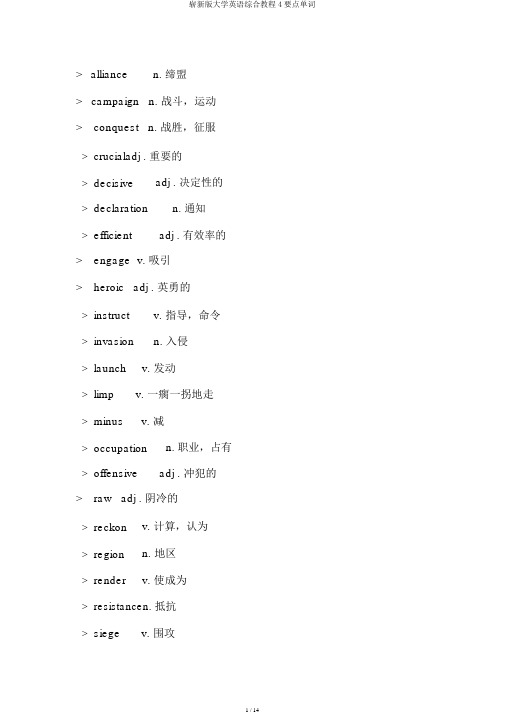
> alliance n. 缔盟>campaign n. 战斗,运动>conquest n. 战胜,征服>crucialadj . 重要的>decisive adj . 决定性的>declaration n. 通知>efficient adj . 有效率的>engage v. 吸引>heroic adj . 英勇的>instruct v. 指导,命令>invasion n. 入侵>launch v. 发动>limp v. 一瘸一拐地走>minus v. 减>occupation n. 职业,占有>offensive adj . 冲犯的>raw adj . 阴冷的>reckon v. 计算,认为>region n. 地区>render v. 使成为>resistancen. 抵抗>siege v. 围攻>stroke n. 打>toll v. 征收>underestimate v. 低估>weaken v. 使虚弱> aboard adv. 在船 / 机上>ambitious adj . 壮心勃勃的>boast v. 吹嘘>cancel v. 取消>concern v. 关心>contest v. 争>objective adj . 客的>obstacle n. 阻挡 , 干>responsibleadj . 的>secure adj . 安全的>stiff adj. 死板; 硬的>withstand v. 抵抗>at the cost of以⋯代价>be faced of面>be/ get bogged down坠入困境>bide one’s time等待机>bring to a halt使停止>catch sb.off guard趁某人不> drag on延误>be engaged in ( doing ) sth . 参加>in the case of在⋯的情况下>press on/ ahead行>reckon with理>stand / get / be in the way 阻挡>take a gamble冒,从事>take its/ a toll造成失>thanks to幸>turn the tide局扭>call off取消>due to由于>hold out供应>in case万一>on the eve of在⋯前夕>pay off获取好果>pin down 把⋯困住>prior to在⋯从前Unit 2> alert v. 使警> apart adj . 分其他> application n. 用 , 申> approximately adv. 大体 , 近似地>automate v. 使自动化>bunch n. 群, 串>calculate v. 计算>computerize v. 使电脑化>correlate v. 使相互有关系>decrease v. 减少>detect v. 观察 , 发现>eliminate v. 除掉 , 消除>expansion n. 扩大>frequency n. 频率>hazard v. 赌运气>incorporate v. 包含 , 吸取 , 合并>lane n. 小巷 , 航线 , 车道>lucrative adj . 有利可图的>magnetic adj . 有磁性 / 吸引力>monotonous adj . 单调 , 无变化的>mount v. 增加 , 爬上>orbit n. 轨道,眼眶>prototype n. 原型 , 标准 ,模范>remote adj . 遥远的 , 偏僻的> satellite n. 人造卫星>signal n. 信号 ; v. 标志>steer v. 控制, 引导 , 驾驶>vapor n. 蒸汽, 烟雾>vibrate v. 震动 , 颤动>accommodate v. 适应 , 调治>address v. 着手解决>affordable adj . 支付得起的>component n. 元件 , 组件>costly adj . 昂贵的>equivalent n. 等价物>exposure v. 裸露>feasibleadj . 可行的 , 可能的>implement v. 贯彻 , 执行>mature v. 成熟>realistic adj . 真实的>resume v. 连续>select v. 选择>shift v. 转移>stress n. 压力 v. 使紧张>thereby adv. 因此 , 从而>be poised to ( do) 做好准备随时> get / be struck in ( sth .)停留,被拥塞>in the air 而未决 ; 在空气中>send out 送信号>start up, 启 ; 开始>take control of控制>turn( sth .) into a reality 成>at the start of在⋯的开始>by means of用,依靠>en route 在途中的> in cooperation with合作Unit 3>applicant n. 申人 , 求者>barely adv., 几乎没有>beforehand adv. 早先>blurt v. 不加思虑地出>chuckle v. 咯咯的笑>endeavor n.& v. 努力 , 全力>generously adv. 大方地>grill v., 烤>inadequate adj . 不合适的> incidentally adv. 便提起地> measurable adj . 可量的>partner n. 搭档 , 同伙>physically adj . 身体上的>preparation n. 准备 , 预备>prospective adj . 预期的>respond v. 回答>rude adj . 莽撞的>sparkle v. 展现>structure n. 构造 , 构造>taxi v. 在水面滑行>veteran n. 老兵>administrationn. 管理 , 行政部门>benign adj . 博爱的>brand n. 商标>carve v. 雕琢>clatter v. 卡塔卡塔的响>coil v. 围绕>fright n. 惊恐 , 吃惊>intricateadj . 复杂的 , 错综的>lengthen v. 使变长>messenger n. 信使>mortal adj . 终有一死的>pregnant adj . 怀孕的 , 妊娠的> quiver v. 抖> scrap n. 小 , 少> tear v. 撕碎>unable adj . 不能够的> as i see it在我看来> ( as) the saying goes俗> beyond one’s wildest dreams无如何也想不到地>follow up 采用一步行>from one’s/ the standpoint ( of )从⋯的点来看>go after努力争取>in sb. ’s hands某人所有>in the neighborhood of大>make a difference生影响>take / have a crack at>come at 向⋯走来 ;>get in 被接或用> put in a word ( for sb.)( 某人 ) 情>take on 聘任Unit 4>academic n. 学者 ; adj . 学的> accelerate v. 使⋯加速> advantageous adj . 有利的>aspire v. 期望获取>asset n.;>center v. 置于中央>considerable adj . 相当大的>contradiction adj . 矛盾>displace v. 取代⋯的地址>divorce v. 使分别,离婚>domestic adj . 本国的>earnest adj . 的>economy n.; 制度>elsewhere adv. 在>endorse v. 同 , 可>entitle v. ⋯ 名>erase v. 擦掉, 抹掉>establishmentn. 当派>facilitate v. 使简单>forefront n. 最前面>growth n. 生>increasingly adv. 在>investment n. 投>landmark adj . 有重要意的> network v. 交>outlook n. 看法,看法>overtake v. 追上 ; 高出>patriotic adj . 爱国的>pendulum n. 摆; 钟摆>strengthen v. 加强>unlike adj . 不像>vanish v. 不见 ; 不复存在>witness n. 目击者 v. 目击>advantage n. 好处>currency n. 钱币>fatigue n. 疲倦>globalize v. 使全球化>herald v. 预告;预示>inherent adj . 内在 , 固有的>namely adv. 就是,即>originate v. 发源,开始>participation n. 参加>software n. 软件>stable adj . 牢固的>subsidy n. 补贴> a handful of少许的> a variety of多种多样的>at odds with 与⋯相矛盾 / 争吵 />be committed to 承 , 忠于>let alone 更不用> make no/ little difference无影响> strike a balance求得平衡>sweep aside 不搭理> a majority of多数,大多数>add to 增加>blow up 炸>phase out 渐渐取消>in evidence 而易的> so be it就吧> take advantage of利用>you bet 的确;自然Unit 5> affectionate adj . 充的>brokeadj . 一文不的>candid adj . 直言不的>capable adj . 能干的> constitution n. 法> current n. 水流>deceptive adj . 靠不住的>definite adj . 明确的>hitherto adv. 迄今为止>insane adj . 蠢极的>instinct n. 本能,直觉>mild adj . 平易的>oddly adv. 奇怪地>pawn v. 抵押>rub v. 摩擦>sip v. 小口抿>spicyadj . 下流的 ; 辛辣的>stroke v. 轻抚>transparent adj . 透明的>trim v. 击败>vacancy n. 空缺>vanity n. 虚荣>wrinkle v. 使起皱纹>assumption n. 假定>dump v. 倾倒>fate n. 命运>guilt n. 内疚>layer n. 层> literally adv. 直>shaky adj . 抖的>sheeradj全然的 , 粹的 .>be/ go ( all )to pieces崩,掉>down and out困潦倒>drive at 意指,要> for sb. ’s ( own) part / the part of⋯⋯来>go broke 一文不,破>in a way 在某种程度上> in accordance with与⋯⋯一致> in bad/ good condition情况好 /坏>oddly enough 来奇怪>something of 某种程度上> stick to持>be taken aback 吃一惊>turn up 出,抵达>with ( a) bad/ good grace勉地 / 欣然的> at one time or another在不同样合> be overwhelmed with被( 某种感情) 深深控制>by far 大大地> come to grips with着手理>conjure up 弄出,变出> get to one’s feet站起来> get / keep under control控制住>pass judgment on 评头论足>reach for 伸出手拿>teach sb. a lesson 给某人一个教训>think up 想出;设计出>well up 涌出,流出。
全新版大学英语综合教程4答案
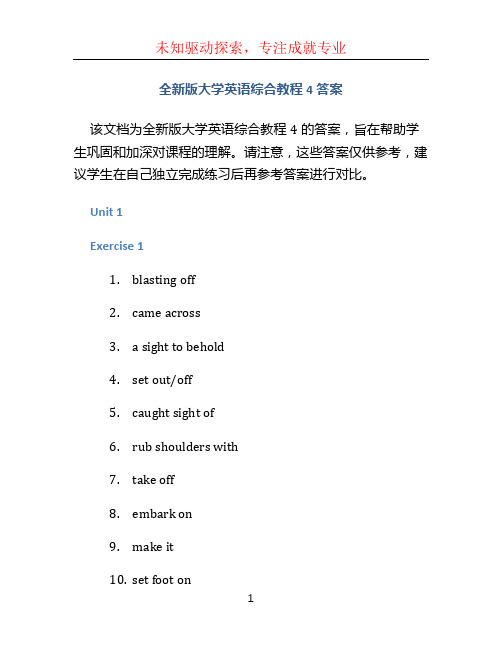
全新版大学英语综合教程4答案该文档为全新版大学英语综合教程4的答案,旨在帮助学生巩固和加深对课程的理解。
请注意,这些答案仅供参考,建议学生在自己独立完成练习后再参考答案进行对比。
Unit 1Exercise 11.blasting off2.came across3. a sight to behold4.set out/off5.caught sight of6.rub shoulders with7.take off8.embark on9.make it10.set foot onExercise 21.Why don’t you take up jogging? It’s good for your health.2.I can’t stand sitting in traffic every day.3.Let’s put off the meeting until next week.4.She ended up selling all her belongings and traveling around the world.5.I’d rather you did the chores before going out.6.I have no clue how to solve this difficult problem.7.You should take advantage of the opportunity to study abroad.8.Could you please turn down the music? It’s too loud.9.We need to come up with a solution as soon as possible.10.I’m so looking forward to the summer vacation. I need a break.Exercise 31.C2.B3.A4.D5.CUnit 2Exercise 11.I regret not taking your advice.2.She insisted on talking to the manager.3.We apologize for any inconvenience caused.4.I suggest going to the new restaurant downtown.5.He denied stealing the money.Exercise 21.It is compulsory for all students to attend the seminar.2.We had a heated discussion about the issue, but we reached a compromise in the end.3.Can you make an exception for me this time?4.The professor has a vast knowledge of the subject.5.The government should invest more in education. Exercise 31.D2.A3.C4.D5.BUnit 3Exercise 11.We cannot afford to be late for the meeting.2.He enjoys hiking in the mountains on weekends.3.She is likely to win the competition.4.We are determined to finish the project on time.5.The company is considering expanding its business overseas.Exercise 21.In my opinion, selling the company is the best option.2.I’m against the idea of building a new shopping mall in the neighborhood.3.We need to take into account the opinions of all stakeholders.4.The government needs to take immediate action to address the issue of pollution.5.It is essential to develop good communication skills for success in the workplace.Exercise 31.C2.B3.A4.D5.CUnit 4Exercise 11.be addicted to2.cope with3.give in4.grow up5.look up to6.put up with7.take after8.take up9.think highly of10.to come up withExercise 21.I can’t put up with his constant complaining anymore.2.It’s not easy to give up smoking, but it’s worth it.3.She takes after her mother in terms of appearance.4.I think highly of his dedication and hard work.5.I have to cope with a heavy workload at the moment, but it will get better.Exercise 31.D2.A3.B4.C5.DUnit 5Exercise 11.make sense2.make up one’s mind3.make progress4.make a difference5.make do with6.make an exception7.make a living8.make a mistake9.make the most of10.make itExercise 21.I finally made up my mind to quit my job and start my own business.2.The organization works to make a difference in the lives of underprivileged children.3.Despite the difficulties, she managed to make a living as a freelance writer.4.We need to make the most of our time together and create lasting memories.Exercise 31.D2.C3.A4.B5.D总结本文档列出了全新版大学英语综合教程4每个单元的练习答案。
全新版大学英语综合教程第四册Unit
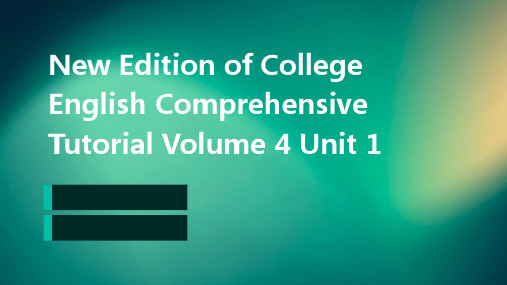
目录
• Overview of the text • Vocabulary and expression • Grammar point parsing • Introduction to Cultural Background • Analysis of Writing Skills • Answers to home exercises after
Key tense
Present simple tense
01
It is used to express an action that is happening now, has
just happened, or will happen in the future
Last simple tense
Conclusion
The article includes by summarizing the main points covered and highlighting the importance of understanding globalization and its impact on our world It also suggests ways for individuals to adapt to the changing world
The text provides a background to the theme by discussing the history and development of globalization, as well as the challenges and opportunities it brings to individuals and communities
新通用大学英语综合教程4_unit01
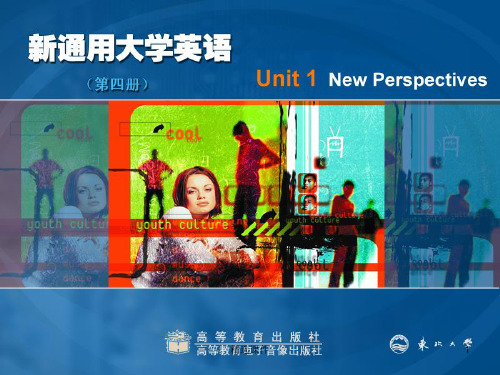
b. had a baby
c. got more free time
d. got married
3. The third speaker’s perspective on life changed when he __a___.
a. lost his home in a fire
b. lost his job
c. got divorced
d. had a serious illness
精选课件
13
B. Understanding Meaning from Context
Read the statements. Then listen again to infer what each speaker means.
a. became a father
b. began working
c. traveled to another country
d. got married
2. The second speaker’s life changed when she ___b__.
a. got a full-time job
GILBERT: Well, it’s been three weeks, and I think I’ve had about enough. I’m tired of eating strange food.
ANNA: Wow! I feel just the opposite. I can’t get over how much I enjoy being here. I love how different the food is.
精选课件
1
Agenda
新通用大学英语综合教程第四册课件及答案unit
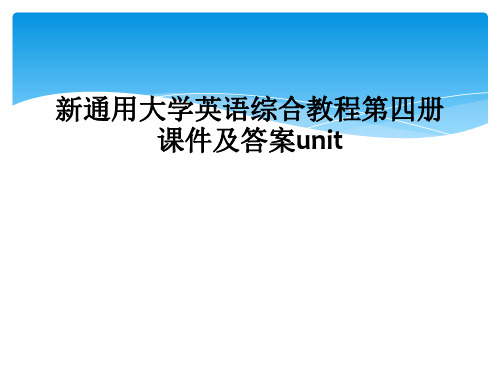
□
□
7. doesn’t take any days off
□
□
Exercise B
Check the statements that are true about workaholics, according to Bryan Robinson.
□ 1. Anyone who works really hard is probably a workaholic. □ 2. Workaholics are similar to alcoholics in some ways. □ 3. Children of alcoholics and those of workaholics each display different
This job is creating a lot of stress for me. 2. “Are you kidding?”
You can’t be serious.
3. “I’m up to my ears in paperwork.”
I have too much work to do. 4. “A little R and R would do you some good.”
□
□
6. includes time for family or friends
□
□
7. doesn’t engage in non-work activities
□
□
8. is willing to work fewer hours if necessary □
□
Exercise B
Circle the letter of the statement that best summarizes what each person says in this part of the report.
